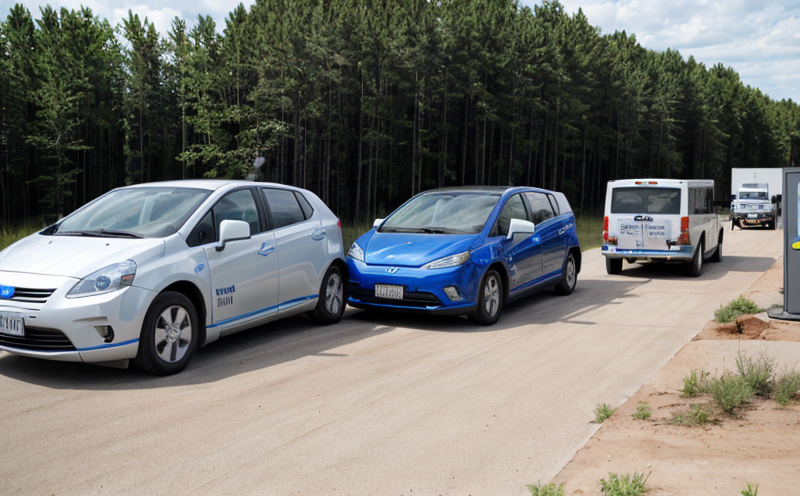IEC 62282-3-300 Stationary Fuel Cell Durability Testing
The IEC 62282-3-300 standard for stationary fuel cell durability testing is a critical component in the development and certification of fuel cells used in various energy conversion applications. This international standard ensures that fuel cells meet stringent performance and reliability requirements, which are essential for their widespread adoption in sectors such as renewable energy, industrial processes, and transportation.
Fuel cells convert chemical energy into electrical energy through a series of electrochemical reactions. The durability testing outlined in IEC 62282-3-300 is designed to simulate real-world operating conditions under which fuel cells are expected to function over extended periods. This includes exposure to varying temperatures, humidity levels, and pressure changes that the cell might encounter during its operational lifecycle.
The test protocol involves subjecting a stationary fuel cell to specific environmental stressors, such as temperature cycling between -20°C and 80°C, relative humidity variations from 10% to 95%, and pressure fluctuations. These conditions are intended to mimic the operational environment in which the fuel cell will be deployed. The testing process is comprehensive and involves multiple stages:
- Initial Conditioning: The fuel cell is first conditioned at a specified temperature, humidity, and pressure before being subjected to the full test sequence.
- Stress Application: The fuel cell undergoes a series of stress cycles that simulate typical operational conditions. This includes voltage cycling, current cycling, and power cycling.
- Data Collection: Throughout the testing process, various parameters such as open-circuit voltage, short-circuit current, and impedance are monitored to assess changes in performance over time.
- Post-Test Evaluation: After completing all stress cycles, the fuel cell is evaluated for any degradation in performance or structural integrity.
The results of this testing provide valuable insights into the long-term reliability and efficiency of stationary fuel cells. Compliance with IEC 62282-3-300 ensures that manufacturers can confidently demonstrate that their products meet the highest standards of quality and safety, thereby fostering trust among buyers and regulators.
Our laboratory offers a fully accredited facility equipped to conduct IEC 62282-3-300 durability tests. We employ state-of-the-art equipment and follow strict protocols to ensure accurate and reliable results. Our team of experts is well-versed in the nuances of this standard, ensuring that every test adheres precisely to its requirements.
Understanding the importance of IEC 62282-3-300 goes beyond mere compliance; it represents a commitment to innovation and sustainability. By investing in durable fuel cells, manufacturers can contribute significantly to reducing greenhouse gas emissions and promoting cleaner energy solutions.
Why It Matters
The durability of stationary fuel cells is not just an engineering challenge but also a pivotal factor in the broader context of sustainable development. Fuel cells that last longer with minimal degradation are more cost-effective, reduce maintenance costs, and extend the operational life of installations.
- Increased Efficiency: Durable fuel cells operate at higher efficiencies over extended periods, contributing to significant energy savings.
- Environmental Impact: Longer-lasting cells mean fewer replacements, reducing waste and environmental impact.
- Economic Viability: Reliable performance translates into lower operational costs, making stationary fuel cell systems more economically viable for businesses and consumers alike.
In addition to these tangible benefits, compliance with IEC 62282-3-300 also enhances a company's reputation as an industry leader in quality and innovation. This can be particularly advantageous when bidding on contracts or seeking partnerships within the renewable energy sector.
The testing process itself serves multiple purposes beyond mere certification. It provides manufacturers with critical data that can inform continuous improvement efforts, helping them to refine their designs for better performance and reliability.
Applied Standards
The IEC 62282-3-300 standard is part of a comprehensive suite of standards developed by the International Electrotechnical Commission (IEC) for stationary fuel cells. These standards cover various aspects of fuel cell technology, from design and manufacturing to testing and certification.
For durability testing specifically, IEC 62282-3-300 provides a standardized methodology that ensures consistency across different manufacturers and regions. This standard is widely recognized and adopted by industry players as it aligns with international best practices and regulatory requirements.
The standard specifies detailed procedures for conditioning the fuel cell before testing, applying stress conditions, monitoring performance parameters, and evaluating post-test results. It also includes guidelines for data reporting and record-keeping to ensure transparency and reproducibility of test outcomes.
Besides IEC 62282-3-300, other relevant standards include IEC 62270 for stationary fuel cell systems and IEC 62459 for hydrogen safety. Together, these standards provide a robust framework that supports the development and deployment of reliable fuel cell technologies.





